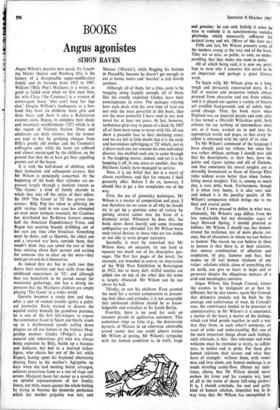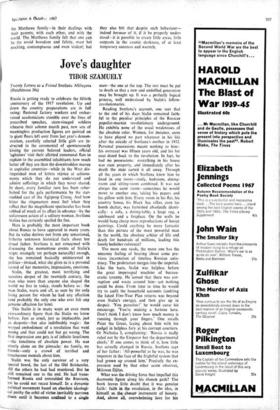Angus agonistes BOOKS
SIMON RAVEN
Angus Wilson's massive new novel, No Laugh- ing Matter (Seeker and Warburg 42s), is the history of a disreputable upper-middle-class family and its fortunes from 1912 to 1967. William (Tilly Pop') Matthews is a writer, as good as failed even when we first meet him; his wife Clara ('the Countess') is a woman of extravagant fancy 'who can't keep her legs shut.' Despite William's inadequacy as a hus- band they have six children, three girls and three boys; and there is also a Rabelaisian cockney cook, Regan, to complete their shady and insanitary establishment ('52') which is in the region of Victoria Station. Duns and adulterers are daily visitors; but the former are kept at bay by grudging cheques from Billy's greedy old mother and the Countess's suffragette aunt, while the latter are suffered and almost encouraged by the children, on the ground that they do at least get their appalling parents out of the house.
It is with the half-dozen of children, with their formation and subsequent careers, that Mr Wilson is principally concerned. At the beginning of the book their attitudes are ex- pressed largely through a medium known as The Game,' a kind of family charade in which they take off the antics of their elders. By 1919 'The Game' at '52' has grown ran- corous: Billy Pop has taken to pilfering the girls' savings (and in one case has attempted an even more intimate treasure), the Countess has distributed her fly-blown favours among half the American Expeditionary Force, and Regan has cooking brandy dribbling out of her ears any time after breakfast. Something must be done; and as Quentin, the eldest son and a returned war hero, reminds them, they needn't think they can spend the rest of their lives whining about their parents and waiting for someone else to clear up the mess—they must get on and do it themselves.
As indeed they do; but in each case they derive their motives and their skills from their childhood experiences in '52'; and although they are henceforth to be parted except for occasional gatherings, one has a strong im- pression that the Matthews children are simply playing 'The Game' in a wider world.
Quentin becomes a randy don and then, after a spot of student trouble (girls), a politi- cal journalist. Early trained to discern the squalid reality beneath the grandiose pretence, he is one of the first left-wingers to expose the communist fraud in Spain and finally winds up as a disillusioned pundit calling down plagues on all our houses in the fruitiest Mug- geridge manner. Gladys ('Pode), a good- natured and industrious girl who was always being exploited by Billy, builds up a business and dedicates her bed to a married father- figure, who cheats her out of the lot; while Rupert, having spent his boyhood obsessively playing Nero to his mother's Agrippina on days when she had nothing better arranged, achieves precarious fame as a star of stage and screen. Margaret bases her career as a novelist on spiteful representations of her family; Sukey, her twin, reacts against the whole boiling by trying to become the domestic perfection which her mother palpably was not; and
Marcus ('Markie'), while flogging his bottom in Piccadilly because he doesn't get enough to eat at home, meets and 'marries' a rich Jewish aesthete.
Although all of them, for a time, seem to be wagging along happily enough, all of them, like the cruelly exploited Gladys, have their comeuppance in store. The passages relating how each deals with his own time of trial are not only the most powerful in this book, they are the most powerful I have read in any new novel for at least ten years. At last, however, turbulence gives way to peace of a kind; by 1967 all of them have come to terms with life, all can show a passable face to their declining years; and we are left in little doubt that it is the early and horrendous upbringing at '52' which, just as it drove each one out towards his own individual disaster, has enabled each one to come through it. No laughing matter, indeed; and yet it is by laughing it off, in one sense or another, that the Matthews family have managed to survive.
Now, it is my belief that this is a novel of classic excellence, and that for reasons I shall presently offer. Before I do so, however, I should like to get a few complaints out of the way.
First, the use of gimmicky techniques. Mr Wilson is a master of composition and pace; I can therefore see no cause at all why he should try to get up a spurious sense of variety by putting several scenes into the form of a dramatic script. Whenever he does this, the book slows down heavily and some tiresome ambiguities are obtruded. Let Mr Wilson leave such trivial devices to those who are too feeble or too idle to write proper narrative.
Secondly, it must be remarked that Mr Wilson does, on occasion, try too hard to squeeze too much out of his descriptive pas- sages. The first few pages of the novel, for example, are intended to convey an impression of the Wild West Exhibition in Kensington in 1912; but so many deft, skilful touches are added one on top of the other that the scene is largely obscured. Mr Wilson can be too clever by half.
Thirdly, so can his children. Even granted the need for a certain compression in present- ing their ideas and attitudes, it is not acceptable that adolescent children should be as know- ledgeable and articulate as Sir Isaiah Berlin, Fourthly, there is no need for such an insistent parade of egalitarian sentiment. This sometimes rings so false (e.g., the democratic hysteria of Marcus in an otherwise admirable crowd scene) that one could almost accuse Mr Wilson of posing. Mr Wilson's sympathy with the human condition is, in truth, large and genuine: he can only belittle it when he tries to embody it in sanctimonious socialist platitudes which necessarily suffocate his natural irony and wit. (More of this later on.) Fifth and last, Mr Wilson presents some of the modern young at the very end of the book. They are so nice, so polite, so cute, so under- standing, that they make one want to puke.
All of which being said, it is now my privi- lege to state why I conceive this novel to be an important and perhaps a great literary work.
To begin with, Mr Wilson gives us a long, tough and intricately constructed story. It is full of tension and peripeteia (which always proceed from character and not from whim), and it is played out against a variety of bizarre yet credible backgrounds and of subtly indi- cated change. Thus, the book starts when England was an imperial purple and ends after it has turned a (Harold) Wilsonian pink; both colours (to say nothing of intermediate tints) are, as it were, washed on to and into the appropriate words and pages, so that every in- cident is informed with the spirit of its time.
To Mr Wilson's command of the language I have already paid my tribute; but since this was rather oblique, perhaps I should now add that his descriptions, at their best, have the gaiety and vigour (grime and all) of Dickens, and that sometimes his moral insights are as shrewdly formulated as those of George Eliot (who seldom wrote better than when formu- lating moral insights). This is, among so much else, a very pithy book. Furthermore, though it is often very funny, it is also very sad; and indeed it is the peculiar quality of Mr Wilson's compassion which brings me to my final and crucial point.
For if I were pressed to define in what way, ultimately, Mr Wilson's saga differs from the less remarkable but not dissimilar sagas of (say) Howard Spring, I should proceed as follows. Mr Wilson, I should say, has demon- strated the resilience, not of mere plastic cut- outs, but of characters in whom we can believe as human. The reason we can believe in- them as human is that there is, in their relations, that uneasy combination of affection and scepticism, of pity, humour and fear, that makes up all real human relations of any value: relations which, alone of everything else on earth, can give us heart to hope and to persevere despite the ubiquitous menace of a cold and meaningless universe.
Angus Wilson, like Joseph Conrad, knows the cosmos to be malignant or at best in- different; but he also knows, again like Conrad, that defensive pockets can be built by the courage and contrivance of man. In Conrad's case, the contrivance tended to be practical or administrative; in Mr Wilson's it is emotional, a matter of the heart, a matter of the feelings, which can bind people together in such a way that they form, in each other's company, an oasis of order and understanding. But one of the most important thing about such feelings, such relations, is this: that tolerance and even welcome must be extended to levity, to selfish- ness, to malice and to pride. For these give human relations their savour and what they have of strength: without them, with sweet- ness and love alone, any human exchange is so much drooling candy-floss. (Hence my insis- tence, above, that Mr Wilson should never eschew his irony and his vampire wit, least of all in the name of sleazy left-wing pieties.) It is, I should conclude, the real and gritty kind of human relation, imperfect but in its way true,- that Mr Wilson has exemplified in
the Matthewi family—in their dealings with their parents, with each other, and with the world. The Matthews family felt that one can be (to avoid boredom and falsity, must be) mocking, contemptuous and even violent; but they also felt that despite such behaviour— indeed because of it, if it be properly under- stood—it is possible to create little areas, little outposts in the cosmic darkness, of at least temporary saneness and warmth.



































 Previous page
Previous page